Episodes
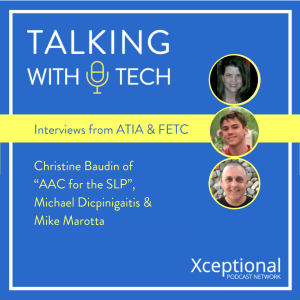
Tuesday Feb 12, 2019
Tuesday Feb 12, 2019
On this week’s episode, Chris talks about his recent tour of the FETC and ATIA conference circuit. Rachel and Chris discuss what it’s like preparing for a big presentation and how to get participants engaged in the material.
In this week’s interviews, Chris has the pleasure of speaking with Christine Baudin (creator of the Facebook Group: “AAC for the SLP”). Chris also talks with amazing high schooler Michael Dicpinigaitis of Jericho Adapts Toys. Finally, Chris speaks with inclusive technology specialist Mike Marotta. Mike shares about his podcast, Inclusive Technology for All, his favorite Chrome extensions, and why Google Keep may be his favorite part of the "G Suite".
Links:
AAC for the SLP: https://www.facebook.com/groups/1539830846285663/
Jericho Adapts Toys: www.jerichoadaptstoys.org
Mike Marotta, ATP: www.MMATP.com and @MMATP on Twitter
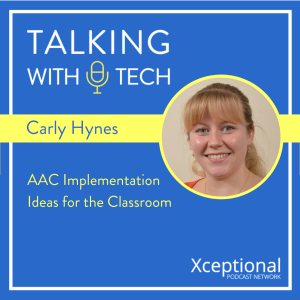
Tuesday Feb 05, 2019
Tuesday Feb 05, 2019
This week on Talking with Tech, Chris and Rachel talk about data management tools and technology that allows open lines of communication between caregivers, therapists, and parents. The TWT team also discusses the power of video clips for data collection, evidence of progress and team communication. Rachel mentions her latest obssession with the website “Loom” for video hosting and sharing. Chris and Rachel also mention a future “Listener Questions Answered” episode and ask listeners to send in their questions and comments and how to start earning CEU’s for listening to “Talking with Tech” podcast at bit.ly/twtcorepd.
On this week’s interview, Rachel speaks with Carly Hynes, a teacher from Liverpool who discusses AAC implementation in the classroom. Carly discusses her journey from one student with complex communication needs to now having over seventeen students currently at her school. She talks about managing multiple devices and team communication for each of her students. Carly describes her modified core word classroom approach and advocates for communication throughout all activities during the day. Rachel and Carly also discuss student motivation, following their line of interest, and why lesson plans need to stay flexible.
For more about Carly Hynes, check out her instagram at: www.instagram.com/sandfieldparkschool/
We want to know what you think! You can connect with us at our Facebook group Talking with Tech, on Twitter, and Instagram (@talkingwithtech)! Also, please subscribe and post a review for us on iTunes- it helps others to find us!
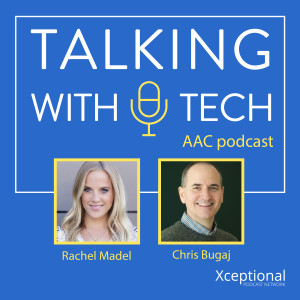
Tuesday Jan 29, 2019
Tuesday Jan 29, 2019
Interested in earning CEU’s for this podcast? Check out the course at bit.ly/twtcorepd.
In this week’s episode, Chris and Rachel talk about balancing administrative tasks, service delivery and direct communication with parents and caregivers. Chris discusses ATIA and a session called “AAC Spotlight” where clinicians get a chance to present a problem with AAC implementation and then discuss different possible solutions. The TWT team discusses therapist and educator transitions that happen when a student progresses through their education, and how parents can help maintain effective services during and after these changes. Chris mentions several easy online tools (piktochart.com and easel.ly) for making infographics as well. To conclude, Chris and Rachel describe how future SLPs can participate in the SLP2B conference presented by XceptionalED (xceptionaled.com/slp2b), and how to earn CEU’s for the “Talking with Tech” podcast at bit.ly/twtcorepd.
Next, Rachel interviews Jason Lehmbeck, an app developer and parent of a child with complex communication needs! Rachel and Jason discuss Special X, his new online pilot platform that acts as a child’s digital binder for parents to keep all important documents together. Jason has also created a team to interact with parents in order to help them navigate and better collaborate with educators, therapists, and government agencies. Jason hosts a podcast, “Who Lives Like This” with Elizabeth Aquino, that focuses on issues relevant to caregivers, advocates, and furthering disability rights (wholiveslikethispodcast.com). During the interview, Jason discusses a therapist that took extra time to discover his son’s motivations and preferences, and how that positively impacted speech therapy for their son. Rachel and Jason also talk about how SLPs can help parents “see the future” in their children’s communication.
Bonus - For a free AAC Transitions worksheet by TWT's Michaela Ball, visit https://www.teacherspayteachers.com/Product/AAC-Transition-Sheet-4342513
We want to know what you think! You can connect with us at our Facebook group Talking with Tech, on Twitter, and Instagram (@talkingwithtech)! Also, please subscribe and post a review for us on iTunes - it helps others to find us!
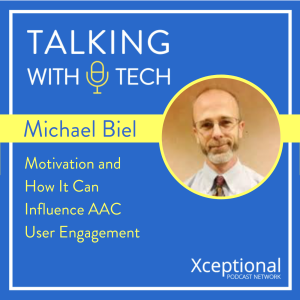
Tuesday Jan 22, 2019
Tuesday Jan 22, 2019
Interested in earning CEU’s for this podcast? Check out the course at bit.ly/twtcorepd!
This week, Chris and Rachel talk about how to engage AAC users, improve their motivation, and why clinicians, not users, should be responsible for creating highly motivating activities. Rachel discusses how to utilize the iPad and augmented reality during therapy to create communication opportunities. The team also describes how to earn CEU’s for the “Talking with Tech” podcast (learn more at bit.ly/twtcorepd)!
In this week’s interview, the TWT team talks with Dr. Michael Biel, Speech-Language Pathologist and professor at California State University, Northridge. Dr. Biel describes how he became interested in motivation for rehabilitation and how he can create treatment opportunities that engage clients and motivate them to persist in their efforts over time.
Next, Dr. Biel discusses Self-Determination Theory and how it applies to therapy. He also discusses how therapists can help motivate a client to make lasting changes to their behavior (e.g., changing how we ask a client what they want to accomplish in therapy). Dr. Biel discusses how to create an environment with clients where they feel they can be honest and genuine without repercussions or judgment. Dr. Biel then addresses the question of “How do I motivate my student when my student doesn’t seem to be motivated by anything?” The terms intrinsic and extrinsic motivation are defined and discussed, as well as the difference between engagement and empowerment. Respecting the autonomy of others is mentioned as a culminating point.

Tuesday Jan 15, 2019
Tuesday Jan 15, 2019
This week, the TWT team interviews Russell Cross of the Prentke Romich Company! Russell is one of the authors of the Unity language system that’s been embedded in all PRC devices since 1996 and has spent over 30 years working in the field of AAC!
Before the interview, Rachel and Chris discuss two of the important ideas covered in the interview: "phrasal verbs" and "key words". Phrasal verbs are essentially combinations of verbs with small words that, in combination, mean something new (e.g., "get up," means something very different than "get"). Chris and Rachel discuss how a "core word of the week" approach doesn't usually emphasize combined words, and how explicit instruction on combining core words AAC users already know can be a great way to build more vocabulary.
Rachel and Chris also talk about "key words", another idea discussed by Russell in the interview. "Key words" are the core and fringe words that are important to a particular person at a particular time. For example, "Santa" is a word that may only be important for a particular time of year, and the name of a person's dog is usually more important to the owner. Teaching key words may help build functional vocabulary in a more personalized and motivating way.
Rachel shares her experiences in the schools recently, including her efforts to find time to teach core words, her challenges with "pushing in" to classrooms for therapy, and the impact of teacher and aide turnover in the classroom. Chris and Rachel discuss the importance of finding small opportunities in the school day to teach core words, and how "finding time in between the lesson" can provide for more language learning opportunities without removing any other instruction.Next, Chris talks with Russell Cross about phrasal verbs, key words, and his experiences at PRC, including helping to develop the Unity language system. First, Russell shares about why the biggest cost of an AAC solution is almost always going to be the costs related to learning the device and help with implementation, not the cost of the device itself. Even if you provide a device to a student, they will not usually learn it without help and instruction. Second, Russell and Chris talk more in-depth about phrasal verbs and how they can be used to boost vocabulary. Finally, Russell discusses the concept of “key words” and why they can be so useful and motivating in vocabulary development!
Links:
Phrasal Verbs: Usage and Acquisition By Emilie Riguel: http://bit.ly/phrasalverbsacquisitionresearch
28 ways to Boost your Client’s Vocabulary by Speech Dudes: https://speechdudes.wordpress.com/tag/phrasal-verb/
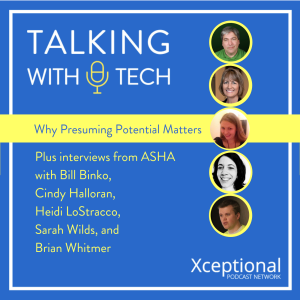
Tuesday Jan 08, 2019
Tuesday Jan 08, 2019
This week, Rachel and Chris discuss the recent article in the ASHA Leader, “The Pitfalls of Presumption” by Katie O’Neil and Rebecca McCarthy. They agree with some ideas in the article, including the importance a well-planned assessment and implementation. They talk about why the phrase “presuming competence” can be confusing, and why they both prefer the phrase “presume potential.” Chris and Rachel go on to share some of their concerns about this article being misused by some clinicians to defend their role as "gatekeeper." If not read carefully, the article seems to advocate a process where clinicians decide who is, and who is not, allowed to receive training on a robust language system. Chris and Rachel go on to discuss why they presume their clients have the potential for robust language systems until proven otherwise, and why they think others should too.
Following this, we share Rachel’s interviews from ASHA with Bill Binko, Cindy Halloran from LAMP Words for Life, Heidi LoStracco of Speak for Yourself, Sarah Wilds of PRC-Saltillo, and Brian Whitmer of Cough Drop!
First, Bill Binko talks about Lesson Pix, a resource for creating custom learning materials for classrooms and therapy. He also talks about AT makers, an organization that seeks to introduce the “maker” community to the assistive technology community (e.g. partnering school robotics teams with people with AT needs).
Second, Cindy Halloran talks about the new version of LAMP Words for Life with improved support for users with visual impairment.
Third, Heidi LoStracco stops by to talk about Speak for Yourself. Rachel and Heidi discuss some of the new updates, how they have tried to make learning the software easier, and a new 30-day trial of the software launching soon.
Fourth, Sara Wilds of PRC-Saltillo discusses ExploreAAC.com, a new site that provides an introductory tutorial on AAC for parents, teachers, new clinicians, and anyone else interested in AAC. Areas covered in the tutorial include the meaning of “AAC,” differences between communication and language, and information about PRC & Saltillo devices and services.
Fifth, Brian Whitmer stops by and chats about this year’s Cough Drop shirt giveaway, why they think the shirts are a way to start conversations about AAC, and how the Cough Drop team come up with the shirt’s theme every year.
Finally, we share Mai Ling Chan’s brief interview with Summer Loehr, winner of the Xceptional Podcast Network contest at ASHA!
We want to know what you think! You can connect with us at our Facebook group Talking with Tech, on Twitter, and Instagram (@talkingwithtech)! Also, please subscribe and post a review for us on iTunes- it helps others to find us!
Links
“The Pitfalls of Presumptions” by Katie O’Neil and Rebecca McCarthy, ASHA Leader (December 2018) https://leader.pubs.asha.org/doi/full/10.1044/leader.FMP.23122018.10
LessonPix: www.lessonpix.com
ATMakers: www.facebook.com/groups/ATMakers
LAMP Words for Life: www.aacapps.com
Explore AAC: www.ExploreAAC.com
Cough Drop T-Shirts: https://shop.spreadshirt.com/coughdrop/
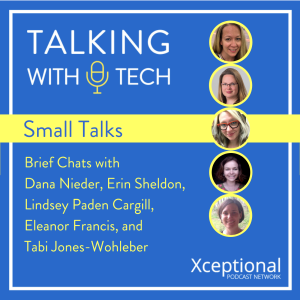
Tuesday Jan 01, 2019
Tuesday Jan 01, 2019
Happy New Year! This week, the TWT team would like to share five “Small Talks”, each 7 minutes or less, that we recorded with TWT guests Dana Nieder, Erin Sheldon, Lindsey Paden Cargill, Eleanor Francis, and Tabi Jones-Wohleber!
In our first Small Talk, Chris chats with Dana Nieder about her 21-day modeling challenge. Dana shares about how she helped people to stay on track with the challenge, gave people new ideas for modeling, and bringing the device along with the family!
Second, Erin Sheldon talks about what she learned listening to feedback from adult users of AAC. This included how to be a better speaking partner with AAC users, why finding out how an AAC user wants to communicate with you is so important, and the need for respecting the privacy of AAC users (e.g., asking permission to use their device, check their message history, etc).
Third, Lindsey Paden Cargill chats about things she does to generate language with students and make learning fun! Helicopter toys, balloons, spin art – Lindsey shares how she uses activities to engage and motivate her students to learn language!
Fourth, Eleanor Francis discusses how her school’s AAC users use the Square app to collect payment for their school’s coffee club! Her students are using the same app as stores use in the community, and the results have been great!
Finally, Tabi Jones-Wohleber talks about “Camp Gizmo”, a summer “camp” where parents, graduate students, and professionals learn hands-on how to help young children with multiple assistive technology needs!
We want to know what you think! You can connect with us at our Facebook group Talking with Tech, on Twitter, and Instagram (@talkingwithtech)! Also, please subscribe and post a review for us on iTunes- it helps others to find us!

Monday Dec 24, 2018
Monday Dec 24, 2018
Happy holidays from everyone here at the TWT team!
This week, join Rachel, Chris, Matt Hott of the SpeechScience podcast, and Mai Ling Chan of the Xceptional Leaders podcast as they gather for a special holiday episode!
These four podcast hosts tackle several “behind the scenes” questions about their podcasts, including: What is the hardest thing about being a podcast host? What is the dumbest thing you have said when recording? Why did you say “yes” to starting a podcast?
We hope you enjoy listening to this episode as much as we enjoyed making it!
We want to know what you think! You can connect with us at our Facebook group Talking with Tech, on Twitter, and Instagram (@talkingwithtech)! Also, please subscribe and post a review for us on iTunes- it helps others to find us!
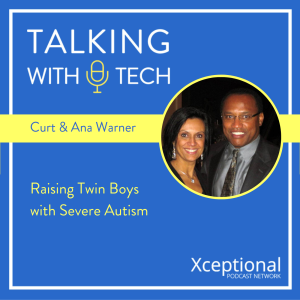
Tuesday Dec 18, 2018
Tuesday Dec 18, 2018
This week, the TWT team interviews Curt and Ana Warner! Curt and Ana are authors, presenters and the parents of four children, including two boys with autism.
Before the interview, Chris and Rachel discuss questions that Chris received during a recent assistive technology event, including: How can we hear more success stories from users? Where should we store large backups of AAC devices? Why is feature matching important? They also talk about Joy Zabala’s SETT framework (student, environment, task, tool) and how understanding problems through this framework can lead to more efficient and effective solutions.
Next, Rachel and Chris sit down for a touching and informative interview with Curt & Ana! Curt is a Former Pro Bowl NFL running back who played for the Seattle Seahawks and Los Angeles Rams. His wife, Ana, has dedicated her life to caring for her family and studying the treatment of autism.
In the interview, Curt & Ana discuss their experience parenting twins with severe autism, how judgment from others was so challenging when their children were young, and how they have stayed together through the ups and downs of parenthood. Curt & Ana share about dealing with complex communication needs, and how difficulty communicating may have caused self-injurious behavior. Finally, Curt & Ana share about the emotional highs and lows of parenting children with autism, and why acceptance and love are so important to them.
Curt & Ana’s book, The Warner Boys: Our Family's Story of Autism and Hope, is available now! For more information, visit bit.ly/thewarnerboys
We want to know what you think! You can connect with us at our Facebook group Talking with Tech, on Twitter, and Instagram (@talkingwithtech)! Also, please subscribe and post a review for us on iTunes - it helps others to find us!
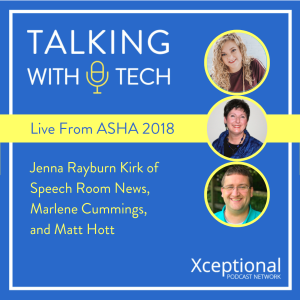
Tuesday Dec 11, 2018
Tuesday Dec 11, 2018
The TWT team is excited to bring you more interviews from ASHA - this week from Jenna Rayburn Kirk of Speech Room News, Marlene Cummings, and Matt Hott of the SpeechScience Podcast!
Before the interviews, you won’t want to miss Rachel and Chris’s discussion of coordination between school and private SLPs! What happens if there is disagreement about the best AAC solution? Why do we need to communicate and come to agreement about this? How can we collaborate more effectively? How can even parents be a roadblock to collaboration? Rachel and Chris cover solutions you can use right away to help coordinate better with your peers, including scheduling apps and feature matching meetings! They also discuss strategies for getting along with people we disagree with, such as finding something in his or her idea to validate.
Next, Rachel sits down at ASHA with the always entertaining Jenna Rayburn Kirk! Jenna and Rachel have a lively discussion about how ASHA has changed over the past few years, including an increased awareness of bloggers, increased utilization of social media, and more interest in online resources! Jenna also discusses why she thinks Teachers Pay Teachers has become so popular, and why services that provide clinicians with useful research, like The Informed SLP, are so important!
Following Jenna's interview, Rachel interviews Marlene Cummings, AAC specialist from Oakland Schools in Michigan! Marlene discusses why AAC specialists can’t be the “expert” any longer, and why it is so important for us to “share the wealth” of AAC with as many people as we can! Marlene shares a few ideas from her presentation, including supporting professionals directly in the classroom, coordinating teacher-directed vocabulary instruction, and more!
Finally, Matt Hott of the SpeechScience Podcast calls into ASHA to interview Rachel about her favorite parts of ASHA, and what her plans are for ASHA 2020 in Orlando!
We want to know what you think! You can connect with us at our Facebook group Talking with Tech, on Twitter, and Instagram (@talkingwithtech)! Also, please subscribe and post a review for us on iTunes - it helps others to find us!
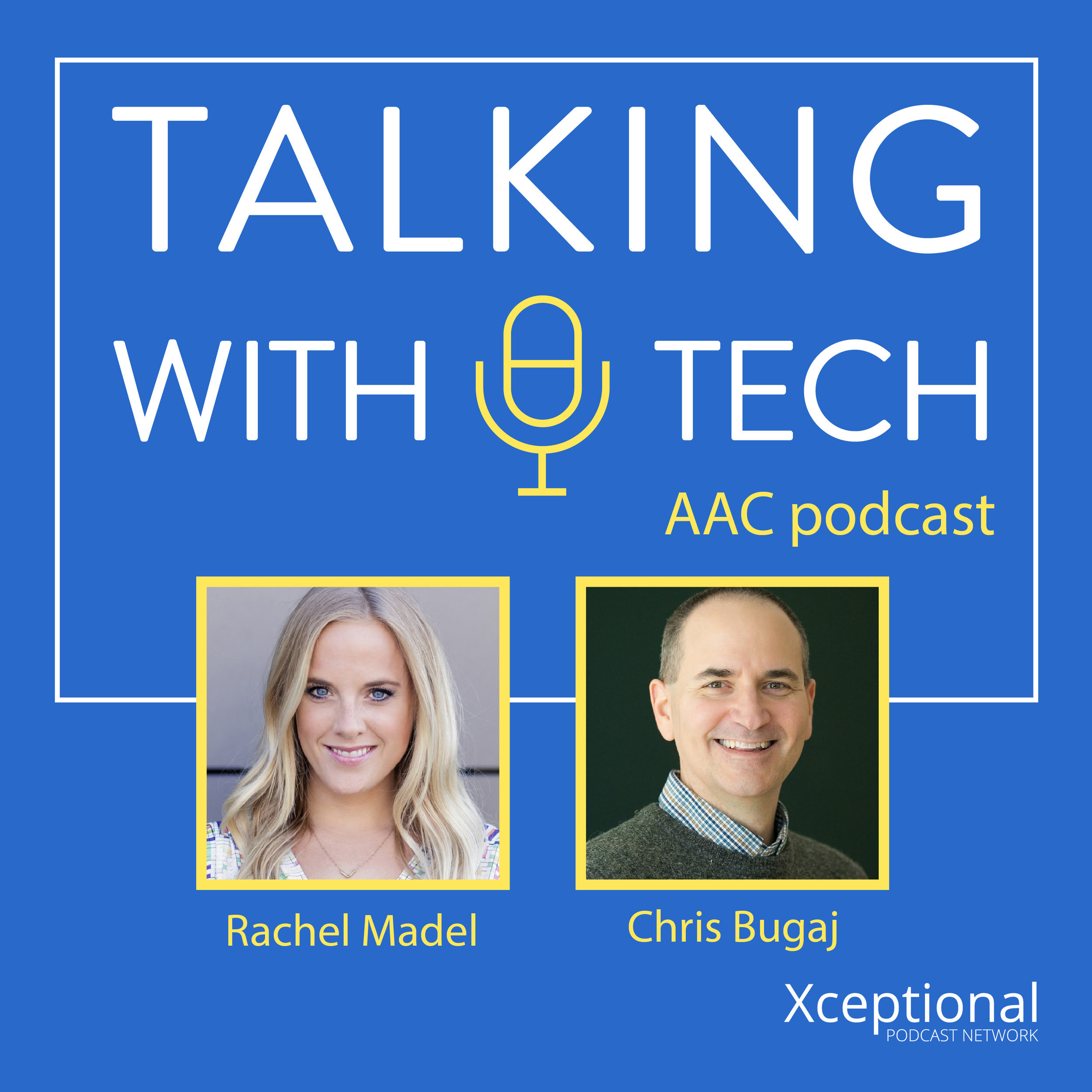
Join AAC experts Rachel Madel and Chris Bugaj as they dive into a weekly discussion about all things AAC (Augmentative and Alternative Communication). Every episode they deliver practical resources, clinical guidelines and relevant research to help clinicians better utilize technology for individuals with complex communication needs.
Episodes include interviews with industry thought-leaders, clinicians, parents, researchers and app developers to keep you on the pulse of the educational technology scene and better support communication through the use of technology.


